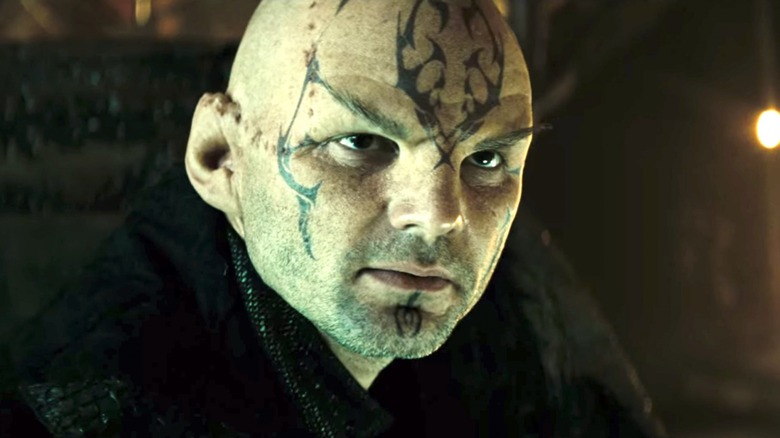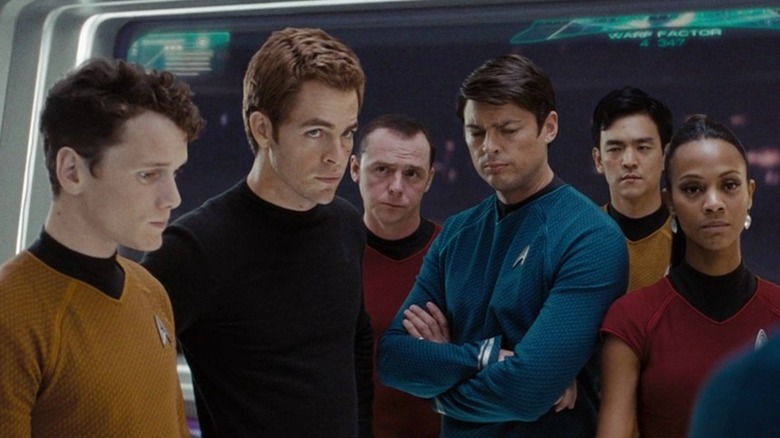Why Eric Bana's Nero Is The Most Dangerous Villain In Star Trek History
When J.J. Abrams rebooted the original characters of "Star Trek," it kicked off an interesting era for the brand. His trilogy of films came before Paramount+ streaming created a monopoly on content all things Trek and had a universe all its own. To use our favorite Vulcan's iconic quote, it was fascinating. Starring Chris Pine and Zachary Quinto as the beloved duo of James T. Kirk and Spock, the films use an alternate timeline that created a series of movies all its own. This alteration allowed die-hard fans to not feel their legacy had been tarnished while also helping attract new fans.
Abrams also did this by introducing the Romulan villain, Nero (Eric Bana). After a supernova destroys his entire planet, a black hole created by Red Matter pulls Nero and his ship back in time to the day of Kirk's birth. This singular change creates a domino effect that permanently affects the course of events. Regardless if it was purposeful or not, Nero's actions do something almost unprecedented in "Star Trek" history, making him one of the most formidable villains.
Nero changed Star Trek canon forever
For almost 60 years, "Star Trek" has had some of the most legendary villains that will live on in infamy. The Borg Queen is one who never gets old because of the existential dread she inspires. As the leader of the Borg hive, her only interest is in simulating people into her extensive network and erasing all sense of identity. Captain Jean-Luc Picard's (Patrick Stewart) temporary assimilation causes residual trauma that never leaves him. Khan reappears in "Star Trek: Into Darkness" and "Star Trek: Strange New Worlds," because of his relevance to the Eugenics Wars. But no matter how singular these villains are, Nero has done something they have not.
Nero traveling back in time and destroying Vulcan is so savage and permanent that other villains pale in comparison. Not only does he enact genocide against the Vulcans, but his damage to the "Star Trek" timeline can never be corrected. The timeline in the reboot has changed the course of Kirk and Spock forever. Kirk has to live with the death of his mentor Christopher Pike (Bruce Greenwood), even though he lives on in the prime timeline. This change was so severe that in "Into Darkness," Kirk is the one who dies from radiation, and not Spock as portrayed in "The Wrath of Khan." This substantial change can only be compared to another antagonist in "Star Trek" history – Q (John de Lancie) is a villain who returns time and again after being introduced in "Star Trek: The Next Generation."
Only Q has had as much of an impact
John de Lancie has only appeared in "Star Trek" a dozen or so times as Q, but that is the beauty of his character. As an omnipotent god-like being, he can come and go as he pleases, and there is no way to defeat him. He is such a hallmark of the series, that he even returned for Paramount+'s "Star Trek: Picard" as a touchstone for the former captain. As soon as de Lancie heard the plan for his character, he was on board. "I asked how they were going to deal with the age and that type of stuff. And [showrunner Terry Matalas] said, 'We will [make it happen] and more importantly, we want you how you are now,'" de Lancie told The Hollywood Reporter.
No one could doubt that Q is a more endearing villain than Nero. The actor has been a part of the "Star Trek" universe for decades and is as welcome as "The Next Generation" crew. And that is why Nero is that much more insidious. Though Q can rewrite realities and play the Enterprise crew like pieces on a chessboard, he is ultimately a trickster figure. He never does anything that cannot be undone — even if it's just by the grace of his power. Nero has no such aspirations. He has no redemption. He only wants to cause suffering, and in a universe that values its utopian society, there is nothing worse than that.


